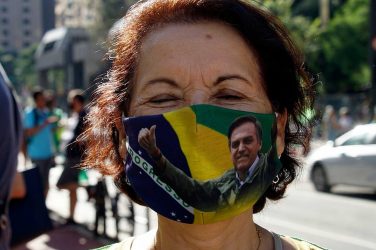Rio de Janeiro’s world famous Carnaval parade will not take place in February 2021 due to the coronavirus pandemic, Brazilian officials announced.
“We came to the conclusion that the event had to be postponed,” said Jorge Castanheira, the president of the group that organizes the annual parades, the Independent League of Rio de Janeiro Samba Schools (LIESA).
“We just can’t do it in February. The samba schools won’t have the time or financial and organizational resources to be ready,” he said.
Rio’s Carnaval, the world’s biggest, attracts millions of tourists from around Brazil and the world to the beachside city each year.
Rio’s elite samba schools, which usually spend the entire year preparing their parades, had said in July that it would be difficult to organize next February’s event if they weren’t able to practice together by September.
“It’s not a cancellation, it’s a postponement. We are looking for an alternative solution, something we can do when it’s safe to contribute to the city … But we aren’t certain enough to set a date.”
Street Parties
Rio’s City Hall has yet to announce a decision about the street parties that also take place across the city. The last year that Carnaval was suspended was 1912, following the death of the foreign relations minister. The mayor of Rio postponed by two months all licenses for the samba schools’ Carnaval parties.
Brazil currently has the second-highest coronavirus death rate in the world. The country has registered 4.7 million infections and nearly 140,000 deaths.
While the spread of the virus has slowed slightly since its July peak, the numbers are still significantly higher than the global average, with nearly 30,000 new cases and 735 deaths per day over the past two weeks.
Rio de Janeiro has been the second-hardest state hit in Brazil, after São Paulo, the country’s industrial hub.
Samba and Slavery
Slaves brought to Brazil from Angola took their songs and dances with them, which they called “semba” or “sàmba.” Their dances celebrated fertility, but in the northeastern Brazilian state of Bahia, where most slaves ended up, the dances developed into an integral part of religious ceremonies. The Brazilian samba originated in Rio de Janeiro, a mixture of African and European musical traditions.
The first samba, “Pelo Telefone” (“By Phone”), was officially registered on November 27, 1916, in Brazil’s National Library. The Carnaval hit was attributed to Brazilian musician Ernesto Joaquim Maria dos Santos, known as Donga.
Nightmare
Rio’s Carnaval is an epidemiologist’s nightmare in a pandemic: an extended festival of tightly packed crowds dancing through the streets and flocking to the city’s iconic “Sambadrome” for massive parades featuring scantily clad dancers, small armies of drummers and all-night partying at close quarters.
DW




